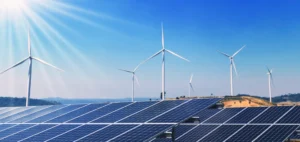The European Union (EU), through the European Commission, announces a new commitment to climate funding. Thus, the European Investment Fund provides funding for a total amount of €247 million.
European funding
The European Union, during the COP27 in Egypt, announced that these funds come from the InvestEU program. It uses private and public funding to support EU policies. Thus, the European Commission states:
“At the COP27 climate conference, the European Investment Fund (EIF), Europe’s largest venture capital and private equity funder, signed investments totaling €247 million to enable five investment funds to support €2.5 billion in climate action investments, helping to achieve the European Union’s climate and energy goals.”
Wind capacity is expected to increase by 301% between 2022 and 2050. For its part, the solar capacity would record an increase of 408% over the same period. This increase fully reflects the increased ambitions of the REPowerEU program.
Indeed, wind and solar together are expected to account for 70% of the combined electricity demand. Wind power reaching 722GW and solar 879GW. In addition, water, food, ocean activities at the center of the concerns of the European Union.
Multiple funds
Of this total of €247 million, the European Union announces that the Eiffel Transition Infrastructure Fund will receive €75 million. The French fund will provide equity bridge financing. It will be used for renewable energy infrastructure in Europe.
75 million goes to Suma Capital Climate Impact Fund III. This will make it possible to support projects related to renewable energy, energy efficiency and intelligent mobility. In addition, waste and water management also includes this amount
39 million goes to Zintinus Fund I, which focuses on sustainable food innovation in Europe. 30 million will go to the Dutch fund PureTerra Ventures I supporting technologies that improve water use, conservation and treatment. Finally, the Growth Blue Fund I will receive €28 million from the European Union to support sustainable economic activities at sea.






















